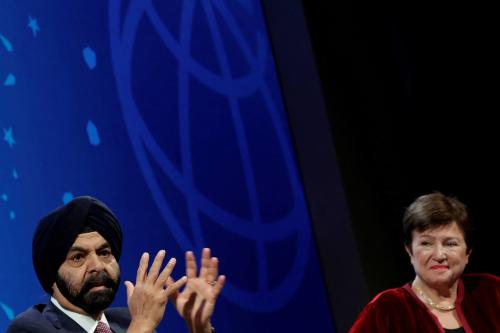When finance ministers convene in Washington in a few days’ time to attend the G-20 and the IMF spring meetings, eyes will be on more than the cherry blossoms.
These meetings will in fact take place on the heels of recent developments in the European response to the crisis and amid renewed fears about the health of the peripheral economies. Eurozone countries have signed on to the fiscal compact, accepting further, more stringent obligations in the conduct of their fiscal policy, as well as the jurisdiction of the European Court of Justice for cases of non compliance. They have also agreed to establish a permanent rescue mechanism, the European Stability Mechanism. Like the temporary rescue fund (the European Financial Stability Fund), the ESM is expected to work very closely with the IMF through joint lending programs, to an extent never before seen at the institution, where such close collaboration has been unheard of.
Yet, there is an underlying tension in the relationship between the euro area and the IMF that these recent treaties just widen. Since the introduction of the single currency, the conduct of domestic monetary policy has been fully delegated to the ECB; however, the realm of international monetary relations remains a grey area, with responsibility opaquely attributed to the ECB and the eurozone group of finance ministers. As a result of this significant gap in the institutional design of the single currency, euro area member countries maintain their country-based—as opposed to a euro area-based—representation on the IMF’s executive board, the institution’s main policymaking organ, despite the increasing integration among eurozone countries in all other related policy domains.
This tension may escalate now due to some potentially-adverse developments in IMF reform. The 2010 governance reform package, which aims to shift 6 percent of the voting power to underrepresented economies, is most unlikely to be ratified this year. The United States, the largest shareholder with power to veto, may do so no earlier than next year and only after the next Presidential campaign. This could mean a failure to ratify the agreement by the previously-determined October deadline, which would put into serious question whether western Europe will indeed give up two seats by the forthcoming board election early this fall, as had been decided in the context of the overall package to strengthen the voice of emerging members. Euro area countries would, in essence, be able to hide behind the US and postpone a much-needed consolidation of their representation, one that would be more in line with their own regional policies.
But all hope is not lost. Germany, France, and Italy may yet provide a burst of leadership by unilaterally establishing their own joint representation, as early as this fall, through some transitional arrangements; this would signal an endurable commitment to the Euro. Mario Monti, Italian prime minister, has all the credentials to take this initiative forward with his peers in France and Germany. They would set up a “core” multi-country seat around which all euro area members would be included by the following board election in the fall of 2014. By including countries, as opposed to European institutions, in the seat, the move would be in line with the fund’s legal framework and would reassure national political leaders in Europe.
At the same time, moreover, the move would signal a long-overdue shift towards a proactive strategy vis-à-vis IMF governance reforms whereby Europe could finally break with the current “wait-and-delay” tactic, precisely at a moment when it needs powerful allies within the fund membership in order to erect a credible global firewall. France, Germany, and Italy would together help set the right tone for ongoing G-20 and IMF negotiations, where many non-European shareholders are expected to contribute to a sizable increase in the IMF’s financial capacity. This would, as well, jumpstart the forthcoming round of negotiations on the redistribution of the voting rights that will have to be finalized by January 2014, with Europe, this time, no longer in a defensive mode.



Commentary
Op-edThe Eurozone Needs a Seat at the IMF Table
April 17, 2012